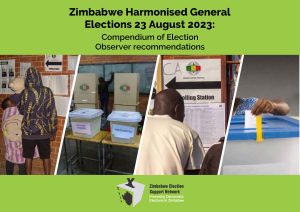This position paper attempts to interrogate whether and under which conditions
Zimbabwe might maintain a right to decide to recall or ‘un-elect’ those elected
representatives. A recall is a ‘mechanism to allow the removal of an elected official from
1 office before his or her term is complete, without waiting for the next general election’ .
From the premise of normative democratic theory, it is a valuable instrument of direct
democracy that can give citizens more control over their representatives to expand
opportunities for reinforcing legitimate and responsive governance and continuous
accountability. This conceptualisation is more relevant in a political system based on
representative democracy where citizens vote for representatives to act on their behalf
2 and in their interest. Yet once elected, officials do not exclusively represent their parties
that nominated them to be candidates but must be representatives of the Zimbabwean
People. This raises the global question as to whether and under which conditions voters
3 might maintain a right to decide to recall or ‘un-elect’ those elected representatives.
To provide insights to the question, a review was made to the relevant constitutional
provisions, constitutional court rulings and related literature and the experiences of other
jurisdictions in Europe, United Kingdom, North America, Latin America and Africa. One
critical observation was that recalls are more prevalent in most undeveloped, emerging
and semi- democratic states compared to more developed democracies. Yet the power
to recall entails a citizen led rather than a party centric process. Within these global trends,
it is observed that Zimbabwe, a semi-democratic state, first enacted recall laws in the late
1980s as a ruling Zimbabwe African National Union Patriotic Front (ZANU-PF) party
strategy to ensure hegemonic control over their rivalries. However, some dominant
opposition elites or reformists during the 2013 constitution making process, argued for its
retention not necessarily as a tool to empower citizens but to largely contain excesses of a
competitive authoritarian state by precluding the real possibilities of solicited and
opportunistic defections by elected officials for personal prebends and to promote the
stability and control of their political parties.
